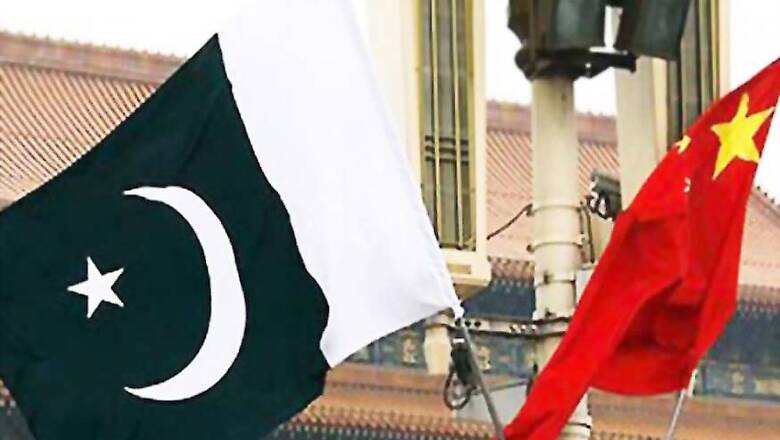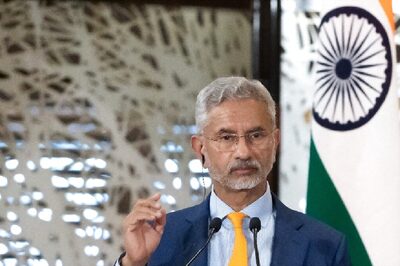
views
New York: Pakistan is building Chinese military jets, weaponry and other hardware as part of a secret plan which for the first time has "explicitly" tied China's trillion dollar Belt and Road Initiative (BRI) to its military ambitions, according to a media report.
The New York Times report titled "China's 'Belt and Road' Plan in Pakistan Takes a Military Turn" said that under the programme that had China insisted was peaceful, Pakistan is cooperating on distinctly defence-related projects, including a secret plan to build new fighter jets.
"In Pakistan, China has found an amenable ally with much to recommend it: shared borders and a long history of cooperation; a hedge in South Asia against India; a large market for arms sales and trade with potential for growth; a wealth of natural resources," report said.
"Now, China is also finding a better showcase for its security and surveillance technology in a place once defined by its close military relationship with the United States, the lengthy report said.
It said that just weeks after President Donald Trump announced suspension of billions of dollars of security aid to Islamabad, the Pakistani Air Force and Chinese officials were putting the final touches on a secret proposal to expand Pakistan's building of Chinese military jets, weaponry and other hardware.
The confidential plan, reviewed by The New York Times, would also deepen the cooperation between China and Pakistan in space, a frontier the Pentagon recently said Beijing was trying to militarise after decades of playing catch-up.
All those military projects were designated as part of China's Belt and Road Initiative, a USD 1 trillion chain of infrastructure development programs stretching across some 70 countries, built and financed by Beijing, the NYT report said.
It added that while Chinese officials have repeatedly said the BRI is purely an economic project with peaceful intent, with its plan for Pakistan, China is for the first time explicitly tying a Belt and Road proposal to its military ambitions and confirming the concerns of a host of nations who suspect the infrastructure initiative is really about helping China project armed might.
The report said that as China's strategically located and nuclear-armed neighbour, Pakistan has been the leading example of how the Chinese projects are being used to give Beijing favour and leverage among its clients.
Since the beginning of the Belt and Road Initiative in 2013, Pakistan has been the program's flagship site, with some USD 62 billion in projects planned in the so-called China-Pakistan Economic Corridor. In the process, China has lent more and more money to Pakistan at a time of economic desperation there, binding the two countries ever closer, it said.
It added that even before the revelation of the new Chinese-Pakistani military cooperation, some of China's biggest projects in Pakistan had clear strategic implications.
It cited the example of the Chinese-built seaport and special economic zone in the Pakistani town of Gwadar, which is rooted in trade, giving China a quicker route to get goods to the Arabian Sea.
But it also gives Beijing a strategic card to play against India and the United States if tensions worsen to the point of naval blockades as the two powers increasingly confront each other at sea," it said.
Further, the report said that a less scrutinised component of the BRI is the central role Pakistan plays in China's Beidou satellite navigation system, in which Pakistan is the only other country that has been granted access to the system's military service, allowing more precise guidance for missiles, ships and aircraft.
The cooperation is meant to be a blueprint for Beidou's expansion to other Belt and Road nations, however, ostensibly ending its clients' reliance on the American military-run GPS network that Chinese officials fear is monitored and manipulated by the United States, the report said.
The report quoted Priscilla Moriuchi, the director of strategic threat development at Recorded Future, a cyberthreat intelligence monitoring company based in Massachusetts, as saying that the focus of the BRI is on roads and bridges and ports, because those are the concrete construction projects that people can easily see.
"But it's the technologies of the future and technologies of future security systems that could be the biggest security threat in the Belt and Road project, Moriuchi said.
It said that in recent years, Chinese state-owned companies have built or begun constructing seaports at strategic spots around the Indian Ocean, including places in Sri Lanka, Bangladesh and Malaysia.
Chinese officials insisted that the ports would not be militarized. But analysts began wondering whether China's endgame was to muscle its way onto coastal territories that could become prime military assets much as it did when it started militarising contested islands in the South China Sea.
"If there was concern within Pakistan about the hidden costs of the China-Pakistan Economic Corridor, also known as CPEC, there was growing suspicion abroad about a hidden military aspect, as well," the report said.




















Comments
0 comment